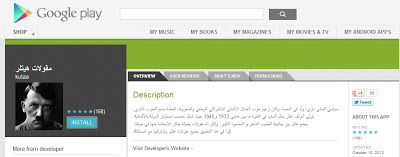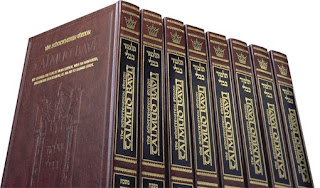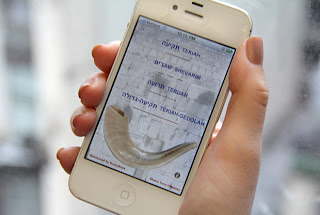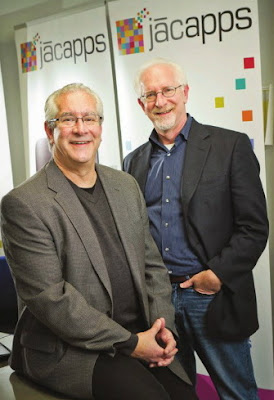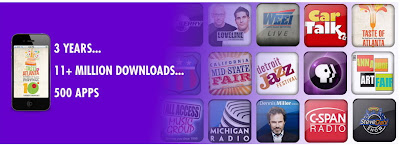These wedsites can be connected with the bride and groom’s Facebook profile and the photos guests take at the wedding can easily be shared to Pinterest and photo sharing sites like Snapfish, Polaroid Fotobar, and Shutterfly. The wedsites include such features as the gift registry, stories about how the couple met and where they became engaged, as well as where they’re headed for the honeymoon. For out-of-town guests these sites have proven to be important resources. Links to the hotel, discounts on airline flights, and the ability to coordinate travel with other guests are essential for a wedsite.
Category: Apps
Google, on the other hand, has made it much easier for developers to offer their apps in Google’s Android marketplace called Google Play. According to Google’s website users are asked to “not distribute content that promotes hatred or violence towards groups of people based on their race or ethnic origin and religion.” When Google is notified of potential policy violation, it “may” review and take action by removing or restricting content, however, it doesn’t have the same screening processes in place that Apple does for its app marketplace. Google’s checklist for app developers to submit their creations for consideration in Google Play includes the requirement that one informs Google Play users of the app’s maturity level before publish. The available content rating levels are: Everyone, Low maturity, Medium maturity, and High maturity. However, Google does not provide for apps that are created in bad taste. A Google spokeswoman explained that the company removes apps that violate its policies against hate speech.
Such is the case with a new app for users in search of inspiration from non other than Adolf Hitler. One app in the Google Play store is simply called “Adolf Hitler.” The description states, “All about Adolf Hitler. Get everything in one place – Bio, Pictures, Videos and Quotes. Not only can you get them in one place, you can share all your favorites with your friends in a click.” Another app, Infamous Adolf Hitler Quotes, proclaims: “Looking for Adolf Hitler Quotes?? Then this is the App for you!” The apps often provide a quote of the day and allow the users to search a database of anti-Semitic quotes including such things as, “Jews are like mosquitoes that suck our blood.”
While quotes from The Fuhrer are searchable throughout the Web using any search engine in any browser, mobile apps dedicated to glorifying Hitler’s hate speech are something else entirely. Hitler’s writings, famous quotes and excerpts from Mein Kampf should be readily available for research purposes on the Web, however, Google should think twice before marketing mobile apps that celebrate the words that motivated the Holocaust.
According to the Anti-Defamation League website, the free app from kutaa provides users with vile quotes attributed to Hitler and has been installed by over 10,000 users within 30 days through Google Play. The Arabic-language app, “Hitler’s Sayings,” allows users to read and share what it describes as Hitler’s “beautiful sayings that we could benefit from in our lives” via social media networks. A description of the app says, “Hitler combines the charisma of the skillful physician and the grand juggler…Read in this application all of Hitler’s sayings and share them with your friends.”
These free apps (some have been downloaded as many times as 50,000 times) are not being used by Holocaust scholars or those seeking to gain a better understanding of the Third Reich. Rather, they are being downloaded and installed to extend the reach of Neo-Nazis in the U.S. While the Arabic language app Infamous Adolf Hitler quotes from the Arab app maker kutaa seems to have been removed from Google Play (it’s still available for download at AppsZoom), other mobile apps tauting Hitler as an inspirational leader are popping up in the Android app market.
The other issue with these Hitler apps that extol the Nazi leader is the vitriolic language in the comments section on the review pages of the apps. In the user review section of one of the free English-language apps dedicated to Hitler’s quotes, one of the more than a thousand reviewers called Hitler a great moral leader. Another user writes in a review dated August 2012 that the “app is so great and useful,” and explains that he wanted to learn how Hitler was able to “kill all the yahudi people.”
In September of last year, Google removed a mobile app of the conspiracy theory book The Protocols of the Elders of Zion. Google eventually removed The Protocols app from its website amid a large public outcry. Google will continue to remove these apps that praise Hitler, but more Android apps will crop up to plague its app market. Google needs to be more vigilant in prohibiting such hate spewing apps from ever residing in Google Play in the first place.
Cross-posted to the Jewish Techs blog on The Jewish Week’s website
The Jewish people are commanded to count these forty-nine days which commemorate the day on which an omer (unit of measurement) of barley was offered in the Temple until the day before an offering of wheat was brought to the Temple on the festival Shavuot. We begin this counting on the second day of Passover and each night announce what day of the Omer it is.
Omer counting devices and special Omer calendars have long been relied upon to help individuals remember the correct count, but in the Digital Age there are websites and apps and text message reminders to help keep the counting correct.
There are also some fun tools to help us count the Omer. For the past 13 years the Homer Calendar has been a fun destination on the Web for Jewish Omer counters who are also fans of The Simpsons. The website, which has had about 225,000 visits, cites Howard Cooper with the idea of an Omer calendar that pays homage to The Simpsons and Homer Simpson, the patriarchal head of the cartoon family. In addition to providing an easy-to-use omer calendar, the site is also a resource for Simpsons fans who want to learn more about the many Jewish references on the show. Brian Rosman, the Homer Calendar’s administrator, also tweets the daily Omer count @CountTheHomer on Twitter.
An introduction to the website explains that it is now in its 13th year, which it calls its “Bart Mitzvah”. The site also mentions that, “When we started, we got a ‘cease and desist’ order from Fox, claiming a copyright violation. Interestingly, the letter was dated on Shavuot. We wrote back, claiming a ‘fair use,’ and haven’t heard anything since.”
Seth and Isaac Galena over at Bangitout.com have come up with two fun ways to count the Omer. With a nod to pop culture, the brothers have created the Movie Lover’s Omer Counter and the Sports Lover’s Omer Counter. The movie counter uses movies with numbers in their titles to remind users which day of the count it is, while the sports counter relies on athlete’s uniform numbers. Perhaps next year they’ll create an omer counter for NASCAR fans with car digits.
There are several mobile apps that help remind users to count the Omer and provide the correct day of the counting. Rusty Brick first released its Counting the Omer app (Free) back in 2009 and it is still an industry leader. The app provides an Omer calendar and includes the blessings and spiritual information pertaining to each day of the period. The free version of the app does not provide a daily reminder to count, but the 99-cent version does. Moshe Berman’s Ultimate Omer 2 ($2.99) not only reminds you to count the Omer, but it also lets you keep track of the days you remembered to count. The app also plays the phone’s default alarm sound to remind you to count.
Mosaica Press released a new app ($4.99) that is based on Rabbi Yaakov Haber’s Spiritual Grow book. The app, which is available in iPhone and iPad formats, helps count the Omer and also provides daily insights with a Kabbalistic flavor. An example of the Jewish spiritual wisdom the app provides is: “Day 10: Make sure that today you not only give people the benefit of the doubt, but even when it seems that they are definitely in the wrong, try to find some way of justifying their actions. Try to see their point of view…Find two things in your life that conflict and make them harmonize.” Some of the app’s features include the proper blessing to recite before counting each night, automatic adjustment for time zone and location, and social network integration to share on Facebook and Twitter.
In addition to the mobile apps, there are other ways that technology is playing a part in the Counting of the Omer. Josh Fleet, one of the editors of the Huffington Post’s religion vertical, came up with the idea of offering a liveblog on the HuffPost Religion site during the Omer period this year. The Omer Liveblog features blogs, prayers, art and reflections for all 49 days of spiritual reflection during the Omer.
Rabbi Heather Altman turned to Google Docs to help assemble other rabbis who would contribute their wisdom to a Counting the Omer project she conceived of to raise money for the Global Seva Challenge. Rabbi Altman launched the seven week email subscription series called Countdown to Freedom which offers a different spiritual insight each day via a subscription-based Constant Contact newsletter. Subscription costs of the daily Omer reflection newsletter raises funds in the fight against human trafficking. Her 49-day project also raises awareness of the global problem of human trafficking, which is now a $32 billion business.
A generation ago, Jewish people simply counted up the days of the Omer until Shavuot arrived. The more spiritually inclined might have delved into the mystical traditions of the counting period. However, no one could have imagined that technology would create so many new aspects to this seven week observance. New technology has certainly opened the door to new ritual.
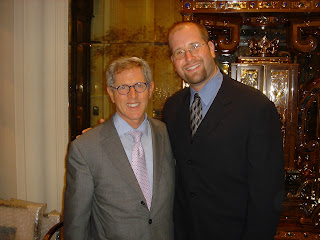 |
| With Jay Schottenstein in the Judaica museum at his home in 2006. |
At Jay Schottenstein’s home in 2006, he told me the story of how his family became so heavily involved in the project of creating a complete English translation and commentary of the entire Shas (set of Talmud). Jay’s father, the late Jerome Schottenstein, was introduced to the ArtScroll publication committee after the first volume of the project, Tractate Makkos, was published in 1990. Jerome Schottenstein started donating funds for the project in memory of his parents Ephraim and Anna Schottenstein a volume at a time. It was only later that he decided to fund the entire project which cost a total of $40 million. Following Jerome’s death in 1992, Jay and his mother Geraldine rededicated the Talmud project to Jerome’s memory while still honoring the memory of Jerome’s parents.
This past Monday evening, Artscroll announced the launch of the “ArtScroll Digital Library” (see the video below). In addition to the entire library becoming available digitally, the mobile app company RustyBrick will design and develop the application software for mobile devices including the Apple iPad & iPhone. The first app that Rusty Brick will launch will of course be the ArtScroll Schottenstein Talmud. According to a press release sent to me by Barry Schwartz of RustyBrick, “The ArtScroll Schottenstein Talmud will revolutionize how the Jewish world learns and studies the Talmud. By combining Artscroll’s mastery of design, layout and content with our technical prowess, this application will change the world of Jewish study forever.”
The Schottenstein Talmud mobile app will offer the following features: Page Syncing, Place Tracking, Extra Hand, Page Fusion, Hybrid Page, Floating Translation, Quick Scroll, Integrated Notes, Page Mapping Color Coding, and much more. Neither Artscroll nor RustyBrick has announced the price of the app. The first release of the app will be limited to Apple devices including the iPhone and iPad. Later versions will be Android compatible.
Just as Deborah Feldman had to sneak her copy of one of the volumes of the Schottenstein ArtScroll Talmud into her Satmar family’s home several years ago, I’m sure there will be other renegade young people today in the ultra-Orthodox community trying desperately to get their hands on the mobile version.
As I walked around the recent International Consumer Electronics Show in Las Vegas, one thing was impossible to miss. Mobile applications are being integrated everywhere and into everything. Smartphones are no longer the only devices on which users are downloading their favorite apps.
2010 saw a proliferation of iPhones and Android phones on the market, and with that came a sharp rise in the number of mobile apps being downloaded. In 2011, we realized that we needed those apps on our tablets, computers and televisions. And 2012 will be the year we download apps to our automobiles as well.
One of the coolest new devices I learned about at the 2012 CES was Pioneer’s AppRadio 2. With its Advanced App Mode, Pioneer is able to bring AppRadio functionality to its line of auto navigation and DVD receivers. Its new AppRadio 2 supports Android devices as well as iPhones and iPads. Imagine having a seven-inch glass touch screen on your dashboard with the same multi-touch functionality of a tablet. This means we’ll soon be using our favorite mobile apps in the car (with caution, of course) to locate the closest restaurant, see the Yelp reviews, and then tweet an invitation to a few friends to meet for lunch.
Apps will also play a prominent role in the soon-to-be-released Windows 8 operating system. As more consumers add Smart TVs to their living rooms and home theaters, the number of mobile app downloads will continue to surge. For those who think the only place people are downloading apps is from Apple’s App Store, don’t fool yourself. Yes, there are now half a million apps in the Apple App Store, but Android is moving quickly to capture half of the worldwide smartphone market in 2012. The iPhone 4S, which began shipping last year, is a big hit, but Android’s new Ice Cream Sandwich is sure to excite as well.
More smartphones, tablets and smart TVs mean more Jewish- themed apps being created and available for download. Plus, one of the nice aspects of mobile apps is that they can be improved by the developer and updated instantly by the consumer. That means that some of the best Jewish apps from 2010 might be on the 2011 list as well, but be certain that there were noticeable upgrades.
This year’s lineup of the best Jewish apps includes (in no particular order) utilities, educational resources, games and novelties. Many apps designed specifically for either Apple or Android devices can, in fact, be downloaded on both.
This is far from an exhaustive list as there are hundreds of other Jewish apps available. Check out www.jewishiphonecommunity.org for a comprehensive listing of Jewish apps as they are released.
I-TORAH WITH ENGLISH FOR IPHONE & IPAD (CROWDED ROAD) – $16.99
This is a complete English translation of the Torah with options for full page or interlinear mode. Includes audio lecture for every portion, with both chapter mode and parsha mode. Users can jump to the weekly parsha with a single click. It is integrated with Torah commentaries from Rashi and Ramban (Nahmanides) and has a full keyword search.
TANACH BIBLE – HEBREW/ENGLISH BIBLE (DAVKA CORP.) – $2.99
It is the ideal study tool for the Hebrew and English Bible on your iPhone, iPod Touch, and iPad. Tanach Bible’s new version features crisp Hebrew text with precise placement of Hebrew vowels and cantillation marks, and verse-by-verse synchronization between Hebrew, English, and Rashi’s commentary.
SIDDUR/LUACH (RUSTY BRICK) – $9.99
Take your weekday siddur with you with this feature-packed Jewish prayer book. You’ll get every version of the Jewish prayer book and real time Zmanim will give you the prayer times for each day based on your location determined with the iPhone’s GPS. A Minyanim database will help you find the nearest prayer service. Also available for iPad.
I-NACH FOR IPAD (MAPLEWOODS ASSOCIATES LTD) – $9.99
iNach is the only iPad app focused on the Nevi’im (Prophets) & Ketuvim (Writings) of the Tanach. Featuring English translation & search, classic Jewish medieval commentaries and a user-interface designed exclusively for the iPad.
I-TORAH BLESSINGS (BEHRMAN HOUSE) – $1.99
This app will help you prepare for the next time you’re called to the Torah. Learn or practice the blessings before and after the Torah reading. Touch-n-Read technology lets you hear each word individually as you read along, and the auto-record feature lets you listen to yourself practice. Also includes the Shehecheyanu and parent blessings for a child, plus video demonstrations of putting on a tallit, and participating in the aliyah process.
JEWISH JOURNAL (TRIBE MEDIA CORP) – FREE
Jewish Journal is the first complete Jewish news app for the iPad.
TIKUN KORIM (RUSTY BRICK) – $19.99
Now you can practice for your bar mitzvah with an iPhone & iPad app that helps you learn to read your bar mitzvah parsha. The app is an interactive Tikun Korim. The Tikun works on both the iPhone and iPad and has many features to aid in learning your reading.
POCKET ISIDDUR (GP IMP) – FREE
This free iPod and iPhone version of the prayer book comes with every version imaginable, from Sephardic to Ashkenazic. The new version has adjustable font size. iPad version also available.
SHABBOS ALARM CLOCK (RUSTY BRICK) – $.99
Displays current time on screen. Set up to three alarms, which automatically shut off after a specified duration (10-50 seconds). Chose genuine alarm clock sound or vibrate. No snooze button function interferes with Shabbat rules.
ALEF BET FOR KIDS (RUSTY BRICK) – $4.99
The Alef Bet App works on the iPhone, iPod Touch and iPad devices and provides a fun, interactive learning experience for children. It helps them learn the Alef Bet through pictures, sound, animation, and interactivity. Each letter of the Alef Bet is accompanied by its Hebrew and English pronunciations, and by a picture of a word associated with it.
RAMBAM’S MISHNEH TORAH (JOSHUA MEIER) – $7.99
This app includes the entire Mishneh Torah including Maimonides’s introduction and his list of Mitzvot (commandments). The app includes the ability to search the entire Mishneh Torah. You can also bookmark different laws. Supports email sharing.
I-PHONE TALMUD DIRECTORY (TES) – $14.99
The complete Talmud dictionary from Marcus Jastrow with over 120,000 entries and bi-directional Hebrew-English and Aramaic-English references.
EICHAH/LAMENTATIONS (HEBREW IN HAND) – $.99
Fully-pointed Hebrew with English translation. Eichah (Lamentations) cries out through time, engulfing the reader in the loss of a city and her people. This ancient poem transcends history, connecting the human tragedy with a call to remember, and to renew faith.
HEBREW EMAIL (RUSTY BRICK) – FREE
Now you can type emails in Hebrew. This application will enable you to type both subject line and email body in Hebrew. It will then send the data directly into the iPhone’s mail application, for you to send to your contacts.
HEBREW BIBLE FOR ANDROID (IVRI) – FREE
Hebrew Bible application. Read/Search the whole Bible on the go.
HEBREW IN A MONTH FOR ANDROID (LEARN LIKE KIDS) – FREE
How to learn to understand the world — a question that has an answer! How can children learn a foreign language within half a year? And why does a regular person spend years of difficult studies on the same task? It’s all because of a certain skill that children aren’t aware of, and adults have forgotten.
TORAH FOR IPAD (RUSTY BRICK) – FREE
This Torah’s 248 columns (amudim) are magically stitched together on your iPad. The tools are provided to make finding the weekly Torah portion (Parsha), bookmarks (famous selections included) and a pointer (Yad). Dive into the ancient texts and experience it all on the Torah.
I-COMFORT (BEHRMAN HOUSE) – $1.99
This app teaches all the Jewish traditions, rituals, blessings, and prayers for the mourning process. iComfort can help you reach out with care and confidence to family or friends who have lost someone they love. If you have lost a loved one, iComfort can help you learn the Kaddish, and calculate the exact dates on which you should recite it.
I-PARASHAH (JACA SOFTWARE SOLUTIONS) – $4.99
This app gives you the weekly Torah portions in the palm of your hand. Search for any parsha by name or date with this app.
SHABBAT SHALOM FOR ANDROID (RUSTY BRICK) – FREE
The Shabbat application will allow you to quickly check the candle lighting times, Havdalah times and parsha for the week in any location in the world. This comes in handy when you quickly want to know when Shabbat is or if you want to know if it is too late to call your in-laws in Israel. Just flip through the different cities and countries, to see what the local time is and what time they start or finish Shabbat.
JEWISH ROCK RADIO (jacAPPS) – FREE
Jewish Rock Radio is the voice of Jewish youth featuring high-caliber, contemporary Jewish rock music with your favorite Jewish rock artists from the US, Israel, and beyond. JRR broadcasts fresh programming including interviews with Jewish youth from coast-to-coast sharing exciting ways they are engaging in Jewish life.
DAF YOMI+ (OKTM WEBSITES) – $4.99
Upgrade version of the free Daf Yomi with the option to choose Masechet (volume) and Daf (page).
ISRAEL365 (NOAH WEISZ) – FREE
This new app combines breathtaking photographs of Israel with inspiring Biblical passages describing the significance of the Holy Land. It features over 25 award-winning Israeli photographers and covers the width and breadth of the Promised Land.
JEW OR NOT JEW (JOHANN LEVY-J SOFT) – $1.99
While a similar version of this app was banned by Apple’s online App Store in France the developer clearly explains that this app is only intended for fun. This App puts together for you thousands of Jewish personalities and defines their Jewish background: Jewish mother, Jewish father or convert to Judaism.
YIDDISH DICTIONARY (DEEP POWDER SOLUTIONS) – $1.99
This application for the iPhone and iPod Touch is a dictionary-based application about Yiddish terms and words
*GAMES*
HEBREW TRIVIA (LUCIDEV) – FREE
Hebrew Trivia Game For Android Devices.
NOISEMAKE GRAGGER (BEHRMAN HOUSE) – FREE
This app is a virtual grogger on your iPhone. You can pick from different sounds or record your own and twirl your iPhone like a gragger to make noise. Remember to wait for Haman’s name.
THE BIBLE BOOCLIPS (CASTLE BUILDERS) – $2.99
Animated by The Kids Bible Company, the outstanding level of the animation of these videos appeals to children of all ages. This digital Bible book narrates unforgettable Biblical stories to children, using vivid animation, video clips and rich graphics from the Animated Kids Bible stories DVD series.
DREIDEL LABRYNTH (BEHRMAN HOUSE) – FREE
Navigate a ball through the labyrinth while collecting gelt and using the pinwheel to spin the dreidel. Collect and wager gelt as you compete. Earn an achievement for each board in the labyrinth. A different labyrinth appears for each letter on the dreidel.
I-HANUKKAH (BEHRMAN HOUSE) – FREE
Learn Chanukah blessings or refresh your memory with your own interactive Chaunkah. Touch-n-Read technology lets you read along and hear every word and sing along too. Record mode makes it easy to practice reading the Hebrew words and automatically saves your last recording.
There’s An App For That!
Local brothers’ jacAPPS business rolls out more than 500 mobile apps.
In what could have easily been mistaken for a scene from HBO’s Curb Your Enthusiasm, two brothers sit at a conference room table in Southfield bouncing ideas off each other for mobile applications that could improve Jewish life.
A small collection of iPhones and iPads sits on the table, as one brother remarks that it would be cool if they created an app that would replay the rabbi’s sermon just in case you dozed off in the middle. The other brother suggests they create an app that allows congregants to choose High Holiday seats by selecting the seats before the holiday and making a donation right from their cell phone. They share a brotherly laugh as they reflect on one brother’s seat-saving tradition in which he drapes tallits (prayer shawls) over the rows of seats for the entire family.
With one look these brothers seem to intuit that they’ve found a need for another app. This look is one that has no doubt been flashed from one brother to the other more than 500 times over the past few years. When there’s a need for something to be available on a mobile phone, Fred and Paul Jacobs will be there to come up with the way to do it.
The brothers launched jacAPPS (pronounced Jake-Apps; a riff on their last name) three years ago when they noticed a need for mobile applications in the radio industry. “Back in the fall of 2008 with the economy facing unprecedented challenges, few would have expected a company like ours to emerge as the leading app developer for radio,” company president Fred Jacobs, 60, of Bloomfield Hills explained.
The brothers’ entrée into the mobile apps market wasn’t by accident. Fred, the oldest of three brothers (Bill isn’t involved in the apps company), formed Jacobs Media in 1983 and went on to create the Classic Rock format while sitting at his kitchen table. Today, the company is the nation’s largest radio consulting firm specializing in rock formats. Each year, Jacobs Media uses Techsurveys to track the leading-edge technology trends in their industry, and in 2008 those surveys pointed the way to the smart phone revolution and the explosion of mobile apps. jacAPPS hasn’t stopped creating apps since and today it is one of the top developers in Michigan.
Having consulted rock and indie radio stations since the 1980s, the Jacobs brothers always try to figure out what radio listeners are doing and how they’re using technology. Their job is to help radio stations better understand the listeners. They knew that radio had lost much of its portability as people were choosing to listen to an iPod or MP3 player in place of a Sony Walkman or portable boom box. In recent years, when they realized that people were beginning to stream their favorite radio stations on mobile devices, they recognized that radio would once again be portable and they leapt into action. Rather than allow their clients to have their music streamed along with other radio stations’ music, they decided it was better to have single station apps. Apple’s AppStore had only been open for 90 days when they got to work on their first mobile app.
“Individual station brands deserved their own mobile apps,” wrote Fred Jacobs on the jacAPPS blog. “Surprisingly, some of radio’s biggest broadcasters took a different direction, building their own ‘umbrella apps’ that featured hundreds of their stations. You cannot underestimate the success of iHeartRadio or CBS’s Radio.com — apps that aggregate hundreds of radio stations under a big tent. Many smart phone owners swear by these apps, allowing them the ability to hear ‘favorite’ stations, while providing a diversity of choice. But our contention was that consumers are less focused on corporate brands than they are on hometown stations in their markets — or in cities where they once lived or visited. And for individual stations, the app experience has been powerful.”
After its incorporation, jacAPPS designed and released 20 apps in six months and began hiring young talent to grow the business. They continuously asked themselves what a mobile application can do that the radio station’s website cannot do.
They already had the listening ears of radio station executives across the country who were ready to implement whatever Fred and Paul Jacobs were recommending. When they told these radio stations that there existed a strategic need for customized mobile apps, the radio stations got in line and put in their orders.
The first app jacAPPS created was for WRIF, a Detroit based Rock radio station. “They did a great job and allowed us to be one of the first radio companies to provide iPhone apps to our listeners and they helped us transform our business from strictly broadcast to a multiplatform media company,” said Tom Bender, senior vice president and general manager of Greater Media Interactive, owner of local stations WRIF, WCSX and WMGC.
“We are now in the development of version 3.0 of our station apps for both iPhone and Android phones,” Bender added. “We have brainstormed for additional new functions that would be of high user interest, and jacAPPS was invaluable in that process. It’s easy to get enthused by a shiny new piece of technology, but to have the research and user input to know how often and exactly how it’s going to be used make the difference. That, more than flashy graphics or slick colors, is the real creative input for me.”
The watershed moment for jacAPPS was when Christian Radio signed on. “We were recognized early on by iconic brands like K-Love and Air1, which opened up the Christian Broadcasting world to us,” explained company vice president and general manager Paul Jacobs, 57, of Farmington Hills. “Car Talk, C-SPAN radio, and other great non-commercial radio franchises have added to our portfolio.”
jacAPPS has been grateful for the many Christian radio stations that have ordered customized mobile apps, but they are especially proud of some of the Jewish-themed apps their company has created such as Jewish Rock Radio, launched by Jewish recording artist Rick Recht. “We launched Jewish Rock Radio with the goal of creating the first truly high-caliber, 24/7 international Jewish rock radio station – a critical communication channel for the Jewish world based on the business models, the aesthetics, and ‘best pratices’ of the very best online radio stations offered in the Christian and secular worlds,” Recht, the executive director of Jewish Rock Radio explained. “When we dug deeper to find the developer behind some of the stations we wished to emulate, we found JacApps. With JacApps, we had found a developer who could not only create apps that were on caliber with some of our favorite Christian stations, but literally had created some of those apps!”
The Jacobs brothers believe strongly that radio stations were originally questioning if their music should be available on a stream, but they have taken it to the next level as their clients realize that they must have an app. They see themselves as improving the radio experience in the 21st century by helping radio stations create something that will generate revenue, enchant their audience and help them better distribute their content in the digital age.
While radio was their springboard into the mobile application industry, jacAPPS now designs and builds apps for a wide array of business categories and industries including festivals, events and sports brands. The Southfield-based company, which was spun off from Jacobs Media this summer, has created apps for the Spartan Sports Network, Ann Arbor Art Fairs, the Detroit International Jazz Festival and the Taste of Atlanta. The company is looking forward to creating apps for political candidates as the upcoming election approaches.
One difficulty for jacAPPS has been the lack of compatibility across platforms. They have had to create separate custom apps for their clients on Apple devices, as well as on the Android and Blackberry platforms.
Since its launch in 2008, jacAPPS has created more than 500 apps for hundreds of clients. And with more than 11 million downloads, they can likely claim the most amount of downloads for any app company in Michigan (Crains Detroit wrote, “The company is by far the leading app developer in metro Detroit.”). What has set them apart is their ability to build a company’s entire mobile strategy from the concept of the app to its design through development and marketing. In today’s portable world, Fred and Paul Jacobs have figured out how to elevate their clients’ brands and to successfully integrate that into the dynamic mobile space.
The jacAPPS team is made up of a handful of young, talented employees who are several decades the Jacobs brothers’ junior. They all seem to understand that mobile applications are the next step in the technology revolution. Bryan Steckler, operations manager, said, “We are now where we were with websites in the 90s. Big brands have mobile apps, and now every business is realizing they need an app.”
The two brothers enjoy working together in the same business. Pointing to his younger brother, Fred said, “If you can’t trust this guy, who could you trust?”
They are both quick to acknowledge that they would not be as close if they weren’t in business together. “It’s a family business and that leads to group collaboration,” Steckler said. “The fact that they’re brothers is what makes the company what it is. And that transfers to our clients as well.”
“We’ve been fortunate to build a team of smart, young talented people here in Southeast Michigan. Our apps are truly ‘exported from Detroit,’ and showcase the resurgence of the technology industry in an area more commonly recognized for its heavy industry,” Fred Jacobs remarked.
The future for jacAPPS is bright as the mobile app market continues to surge. “We see nothing but growth and expansion ahead. By blending strategy, research, and keeping a laser focus on the consumer experience, our expectation is that jacAPPS will become a leader in full-service mobile resource for brands of all types that recognize the mobile future,” said Fred.
The company has had its share of proud moments as it became one of the top mobile app developers. jacAPPS has had the top app in the App Store in New Zealand; its NPR Radio app was featured on the front page of the U.S. App Store; and its app for Pulse 88.7 in New York was featured on a billboard for Apple.
jacAPPS has developed a number of mobile apps for nonprofit companies at either no cost or discounted rates. The team has also taken pride in having the opportunity to work with interesting people. Among its clients is a Native American Council made up of several tribes. jacAPPS has created an educational application to teach the Native American language to children. As the development team demonstrates the app on an iPad, it is clear that they understand the role they have played in the continuity of these people’s heritage.
Paul Jacobs holds his iPhone and with a smile says, “We’re never more than six feet away from this device. This is the one device that’s always with you and the one that you’ll return home for in the morning if you forgot it. It is the hub of a person’s identity.”
The phrase “there’s an app for that” has become a popular punch line and much of the reason for that can be attributed to Fred and Paul Jacobs and their creativity.
